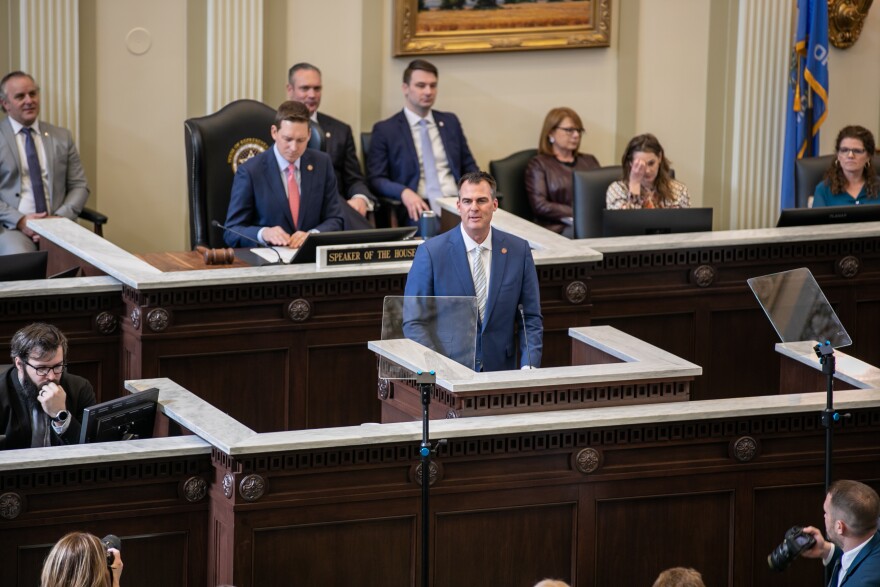Lawmakers are returning to the State Capitol on Monday to convene the new regular legislative session and hear the governor's State of the State Address.
TRANSCRIPT
Dick Pryor: This is Capitol Insider - taking you inside politics, policy, and government in Oklahoma. I'm Dick Pryor with Quorum Call publisher Shawn Ashley. The second session of the 59th Oklahoma Legislature is upon us. It begins at noon this Monday. The highlight of the first day is the governor's State of the State Address, which we will cover live on KGOU starting at 12:30. Shawn, governors always mention some things and toss in a few surprises. So, what would you expect to hear this time from Governor Kevin Stitt?
Shawn Ashley: Well, I don't think it will come as a surprise that Stitt will probably mention tax cuts. He is oh for five in his attempts to get the legislature to reduce the individual income tax since 2021 in two regular and now in three special sessions. That, I expect, will be high on his agenda, and he will have a statewide audience that he can encourage to call on the Senate to put that issue up for a vote. Much of what you will hear, I expect, will focus on Stitt’s goal to make Oklahoma a top ten state. So, he will talk about things we've heard before, like business recruitment and retention, improving education, and perhaps the school choice tax credit program that was approved last year. One of the more unique things Stitt may address is artificial intelligence. Stitt created a task force on emerging technologies, particularly artificial intelligence, in September, and it issued its recommendations a few weeks ago. Stitt said then Oklahoma truly could be the AI capital of the nation. So, I would not be surprised to see him advocate for some of the task force's recommendations.
Dick Pryor: The regular session convenes with a special session already in progress, called by the governor to get the legislature to reduce the individual income tax rate. As you mentioned, that's a priority for him. Where does that stand?
Shawn Ashley: The House passed a bill Wednesday that reduces all individual income tax rates by one quarter of one percentage point. The Senate, however, adjourned that special session on Monday to the call of the chair. So, it literally was not around to consider the House's bill. Senate President Pro Tem Greg Treat said the Senate wanted to wait until after February 15th, when the Board of Equalization issues its new revenue estimate for the upcoming fiscal year, before taking action on a tax cut.
Dick Pryor: How will lawmakers handle these two sessions going on at the same time?
Shawn Ashley: You know, it's not especially unusual to have special sessions running concurrently with the regular session. Just last year, for example, the legislature called itself into special session during the regular session to write the current fiscal year's budget. Put simply, they will flip flop back and forth between the two sessions as they need to. The regular session, for example, may adjourn at 4:00 one day, and then they will immediately convene the special session for however long they need to meet.
Dick Pryor: In brief, what are legislators saying will be their top priorities for the session?
Shawn Ashley: Education appears to continue to be a top issue. Senate Education Committee members outlined a series of proposals Wednesday that include bills to provide scholarships to college students studying to be a teacher in exchange for time in the classroom, teacher pay raises, and an increase in the earnings cap for retired teachers returning to the classroom. Sort of touching the entry, middle, and end of the teacher pipeline. Business recruitment and retention seems high on the list, with several new incentives proposed, as well as a significant piece of legislation that would change how Oklahoma recruits and attempts to retain businesses. Several criminal justice reform proposals were filed, along with bills that create new crimes or increase penalties for others. There are bills to fund deferred maintenance projects at colleges and universities and state facilities that appear to have some legs. With more than 2,000 new bills and joint resolutions filed there's really lots for them to talk about.
Dick Pryor: And early in the session, there's always considerable discussion about bills that generate a lot of attention. We can expect some of that over the next few weeks, but those bills usually go nowhere.
Shawn Ashley: That's where the committee process comes into play, and that's where the grain is separated from the chaff. Only 400 bills or so actually will land on Governor Stitt’s desk by the end of the legislative session. So, there's a lot of culling that will take place.
Dick Pryor: Thank you, Shawn.
Shawn Ashley: You're very welcome.
Dick Pryor: We'll be back together for live coverage of the State of the State Address on KGOU starting at 12:30 this Monday. Until next time, with Shawn Ashley, I'm Dick Pryor.
Listeners like you provide essential funding for KGOU’s news reports, including Capitol Insider, available in podcasts, online, and on the air. Information on how to contribute is at KGOU.org.





